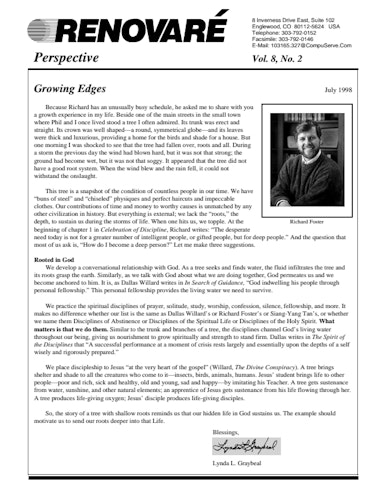Because Richard has an unusually busy schedule, he asked me to share with you a growth experience in my life. Beside one of the main streets in the small town where Phil and I once lived stood a tree I often admired. Its trunk was erect and straight. Its crown was well shaped — a round, symmetrical globe — and its leaves were thick and luxurious, providing a home for the birds and shade for a house. But one morning I was shocked to see that the tree had fallen over, roots and all. During a storm the previous day the wind had blown hard, but it was not that strong; the ground had become wet, but it was not that soggy. It appeared that the tree did not have a good root system. When the wind blew and the rain fell, it could not withstand the onslaught.
This tree is a snapshot of the condition of countless people in our time. We have “buns of steel” and “chiseled” physiques and perfect haircuts and impeccable clothes. Our contributions of time and money to worthy causes is unmatched by any other civilization in history. But everything is external; we lack the “roots,” the depth, to sustain us during the storms of life. When one hits us, we topple. At the beginning of chapter 1 in Celebration of Discipline, Richard writes: “The desperate need today is not for a greater number of intelligent people, or gifted people, but for deep people.” And the question that most of us ask is, “How do I become a deep person?” Let me make three suggestions.
Rooted in God
We develop a conversational relationship with God. As a tree seeks and finds water, the fluid infiltrates the tree and its roots grasp the earth. Similarly, as we talk with God about what we are doing together, God permeates us and we become anchored to him. It is, as Dallas Willard writes in In Search of Guidance, “God indwelling his people through personal fellowship.” This personal fellowship provides the living water we need to survive.
We practice the spiritual disciplines of prayer, solitude, study, worship, confession, silence, fellowship, and more. It makes no difference whether our list is the same as Dallas Willard’s or Richard Foster’s or Siang-Yang Tan’s, or whether we name them Disciplines of Abstinence or Disciplines of the Spiritual Life or Disciplines of the Holy Spirit. What matters is that we do them. Similar to the trunk and branches of a tree, the disciplines channel God’s living water throughout our being, giving us nourishment to grow spiritually and strength to stand firm. Dallas writes in The Spirit of the Disciplines that “A successful performance at a moment of crisis rests largely and essentially upon the depths of a self wisely and rigorously prepared.”
We place discipleship to Jesus “at the very heart of the gospel” (Willard, The Divine Conspiracy). A tree brings shelter and shade to all the creatures who come to it — insects, birds, animals, humans. Jesus’ student brings life to other people — poor and rich, sick and healthy, old and young, sad and happy — by imitating his Teacher. A tree gets sustenance from water, sunshine, and other natural elements; an apprentice of Jesus gets sustenance from his life flowing through her. A tree produces life-giving oxygen; Jesus’ disciple produces life-giving disciples.
So, the story of a tree with shallow roots reminds us that our hidden life in God sustains us. The example should motivate us to send our roots deeper into that Life.
Blessings,
Lynda L. Graybeal
Text First Published July 1998


